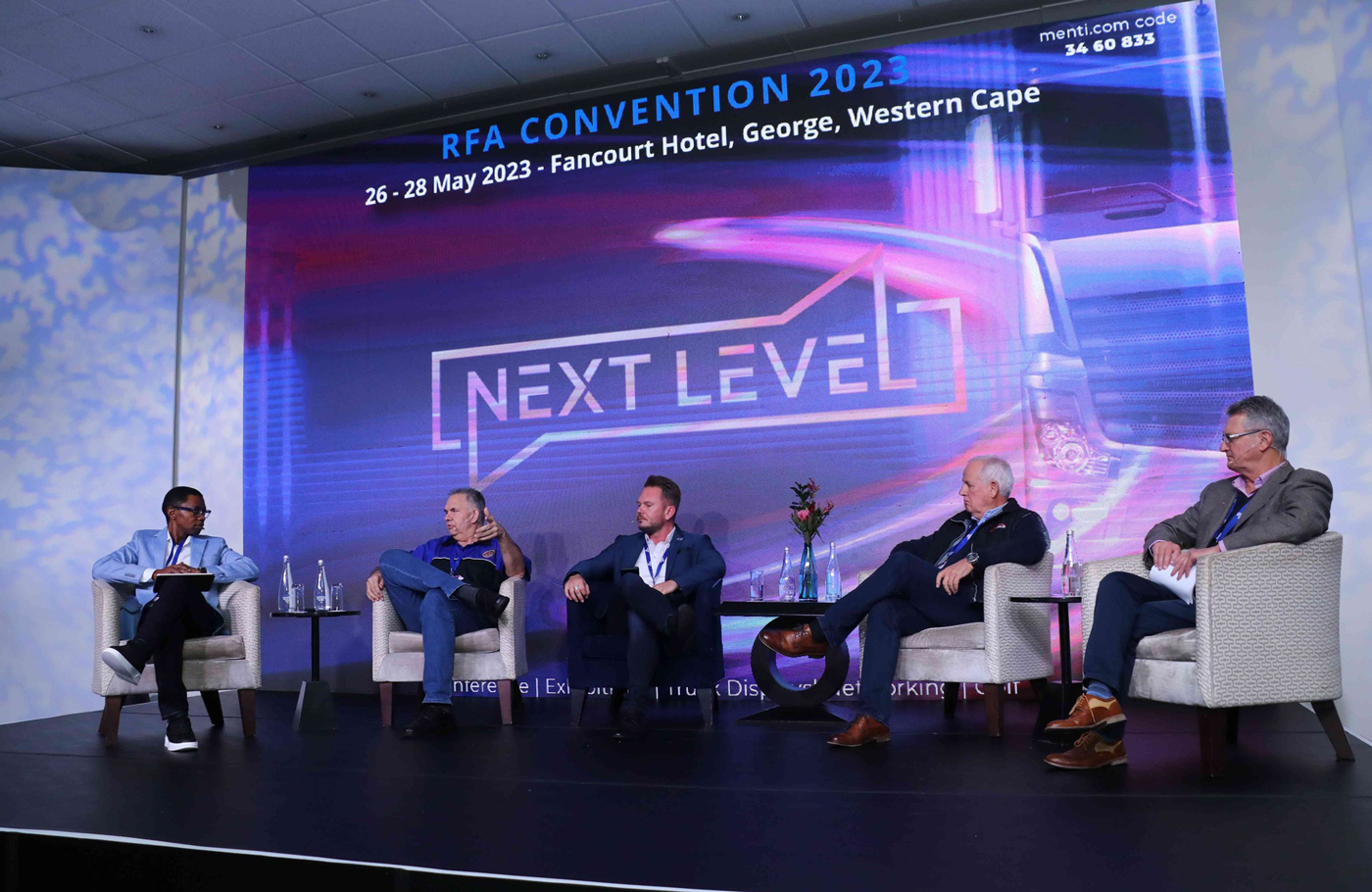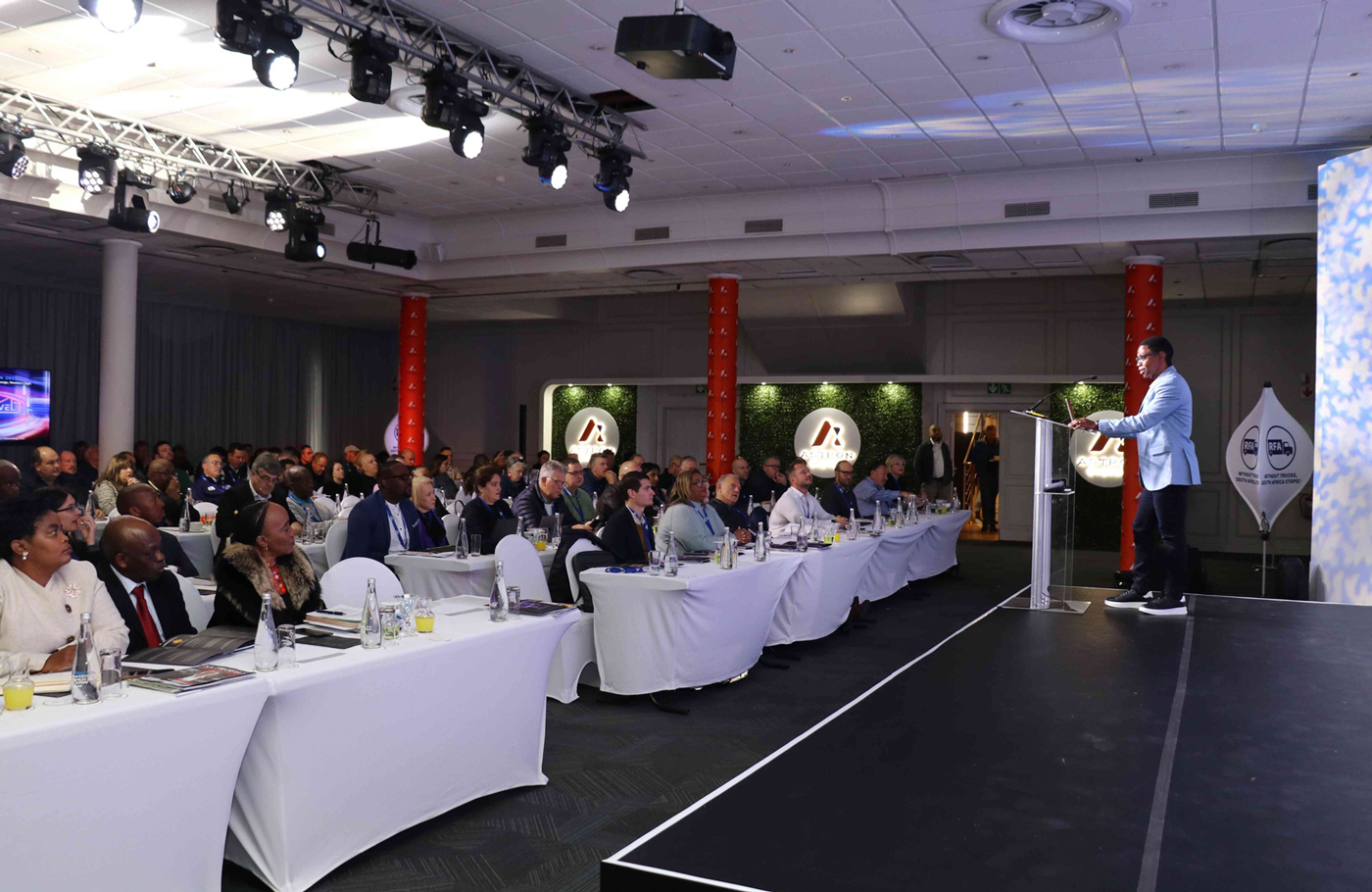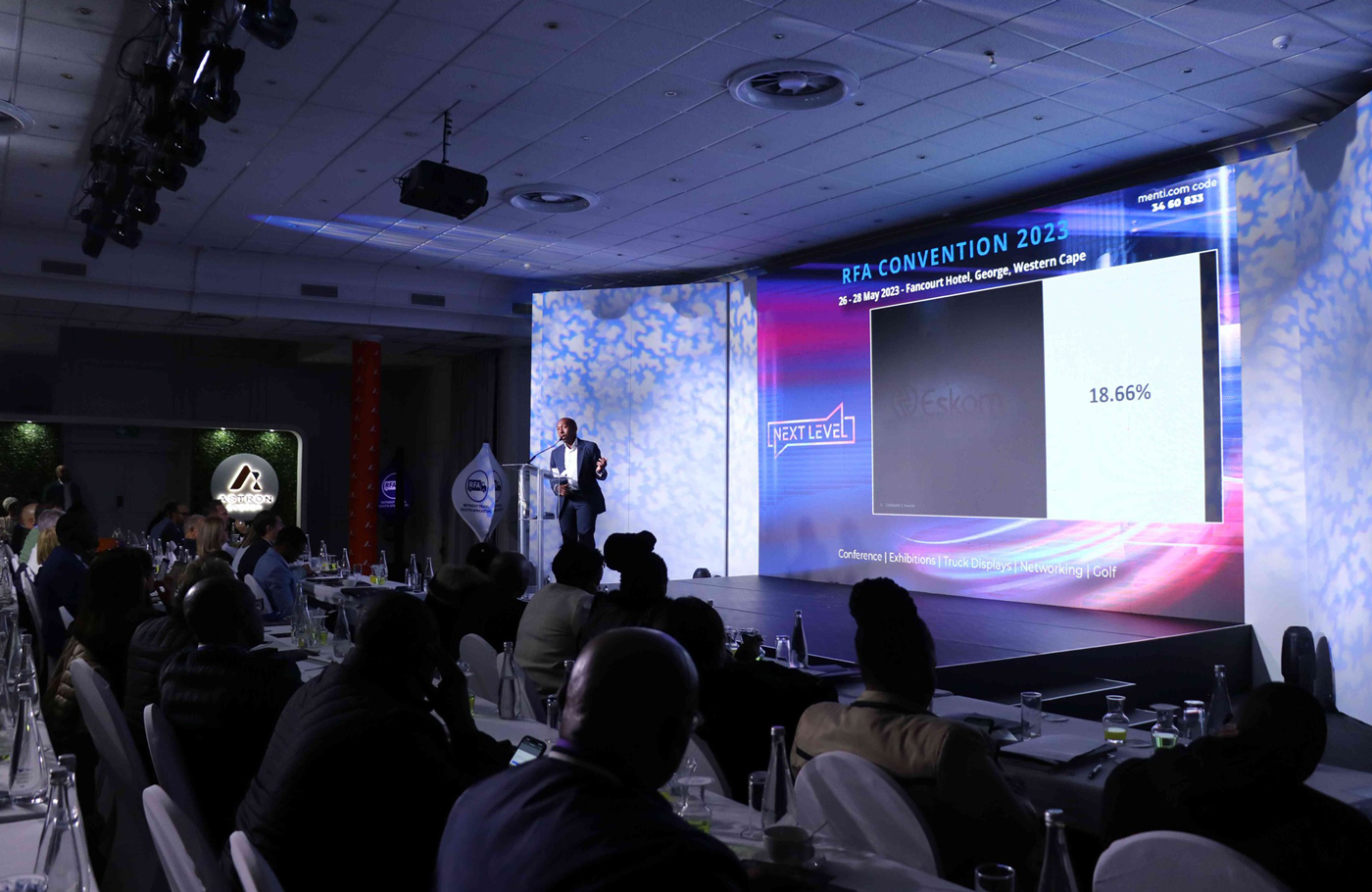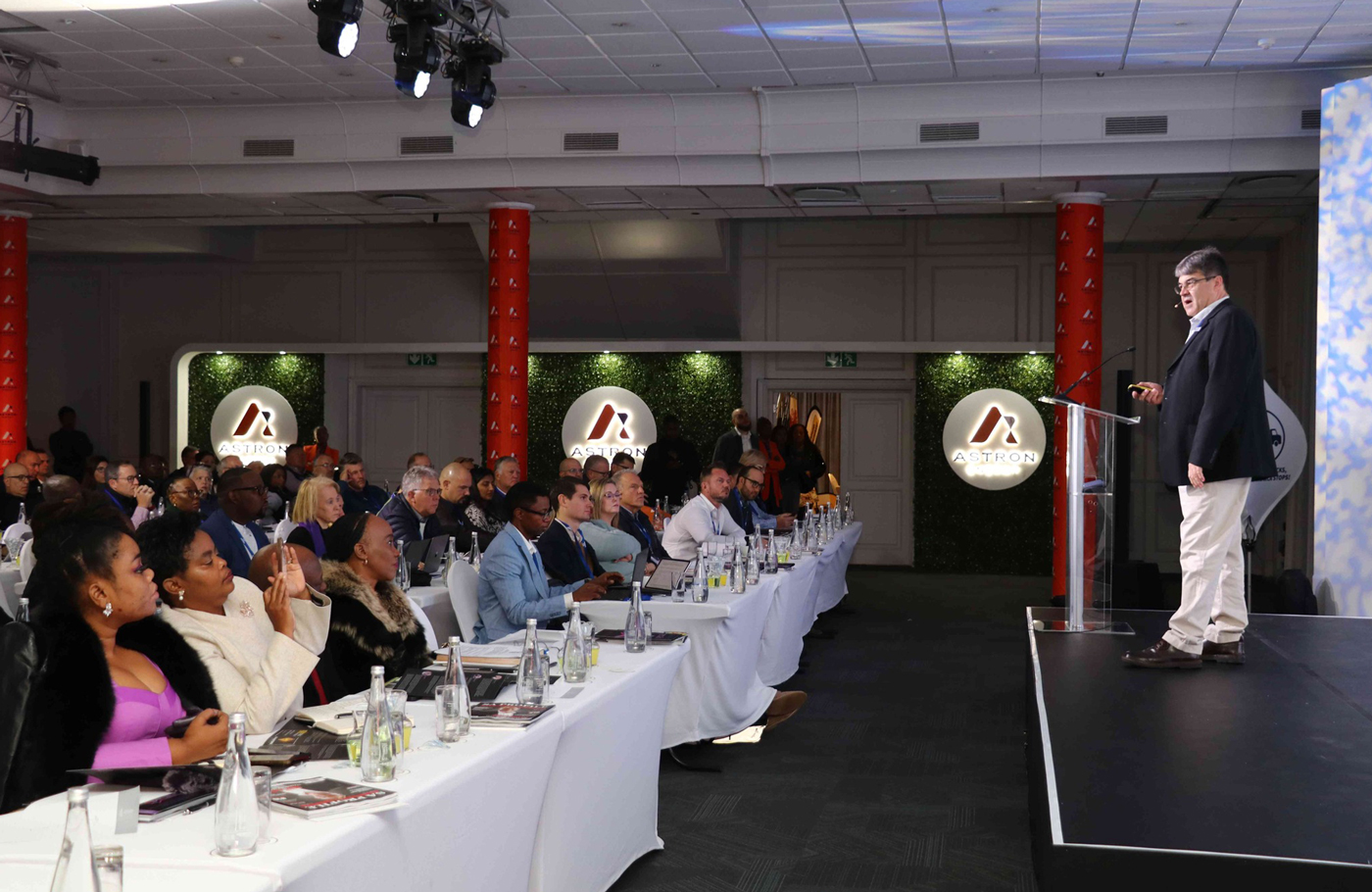RFA Convention abuzz with ideas
RFA Convention abuzz with ideas
As the dust settles on the annual Road Freight Association Convention, NICCI SCOTT-ANDERSON reflects on a gathering that truly stood apart on the annual calendar of transport industry events.
This year’s convention, though intimate in scale, was buzzing with innovative ideas, thought-provoking discussions, and meaningful connections. It demonstrated the industry’s resilience and adaptability, making an indelible mark on all who had the opportunity to attend.
It was impossible to overlook the icons of industry as we gathered for pre-dinner cocktails on the chilly Friday evening at the start of the convention. It is important that we honour these men and women, who have ceaselessly served as guardians of the road freight industry. Their unwavering dedication and enduring spirit have proven to be the industry’s bedrock, driving change and kindling hope even in the face of volatility. Their profound wisdom, garnered from years of hands-on experience, serves as a guiding light for all those navigating the intricacies of this ever-evolving and complex sector.
On that note, Penwell Lunga, Road Freight Association (RFA) chairperson, set the tone for the conference, stressing that the sector is “faced with some serious challenges” and that as an industry, “we are involved in a battle for survival”. Lunga went on to state that it is critical that all organisations – irrespective of size and maturity – participate in the “battle plan” to fight against the challenges impacting operators. These challenges include a stagnating economy, violence against truckers, high inflation, escalating fuel costs, and global uncertainty, amongst others. Lunga urged the industry to draw upon its diverse strengths and capabilities, collaborate, and be the change we need to see.




This sentiment was echoed by Gavin Kelly, RFA chief executive officer. Kelly stated that 80% of RFA members are small, medium, and micro enterprises (SMMEs) who are given a voice by the association. He said that these members need to use the platform, including its many sub-committees and interest groups, to evoke transformational change. Kelly requested cooperation and collaboration with all the stakeholders to drive sustainable change and reduce the pressure on road transportation by returning to rail.
Minister of Transport Sindisiwe Chikunga delivered the inspiring keynote address, instilling renewed hope that government is listening and has adopted a proactive approach to dealing with many of the challenges impacting the sector. Chikunga has requested more collaborative attempts to find solutions and committed to a stronger 24/7 on road law enforcement presence to ensure safer roads. The Minister spoke of the unsustainable cost to our economy of maintaining the national road infrastructure, due to the exponential increase in truck traffic leading to premature road decay. She mentioned the need to turn to the private sector to adopt and manage the maintenance of sections of the road network, noting that after all, it was our trucks using and decaying these roads, specifically in provinces such as Mpumalanga, as well as along the N2. Various government departments and institutions are collaborating firstly in the creation of a truck stops framework document to deal with the poor conditions endured by drivers (including poor safety and wellness) and secondly, the enforcement of bargaining council agreements that address working and resting hours. She once again stressed the need for South African operators to refrain from employing foreign drivers when there were capable South African drivers available for employment.
Chikunga applauded the innovative and collaborative efforts of the private sector to work alongside government. In this way, the sector is helping to accelerate government’s efforts and to find solutions for building an enabling environment in which the freight industry can operate as efficiently as possible and thrive.
She also highlighted the industry’s vital role in climate change discussions, acknowledging that there were both positive and negative impacts in preventing South Africa’s isolation from the global economy. Additionally, she said, government had reached a juncture where it was more comfortable in adopting various proposed policies to improve regional harmony. These encompass free trade agreements among the Southern African Development Community (SADC), East African Community (EAC), and the Common Market for Eastern and Southern Africa (COMESA). The Minister urged industry to get involved in all these discussions by tabling the potential impact on the sector before new policy adoption.
Once again, the lack of transformation within the sector was still a priority for government. Chikunga believed the industry could do better in its efforts to drive transformation. She acknowledged Kelly’s statement on the improved representation of SMMEs as members of the RFA. However, she said, this was not evident when taking a view of the attendees in the room. To improve transformation efforts, government has launched the Integrated Transport Sector BBBEE Council, tasked with the responsibility to develop transport sector codes to address some of the glaring transformation challenges.
In the realm of driver safety, Steve Ford, representing Optix Africa, introduced the company’s groundbreaking AI-driven technology. This innovative solution combines efficiency and risk management through the utilisation of smart technology. By empowering drivers to make better decisions, the technology addresses issues like fatigue management, inattention caused by cellphone usage, and eating and drinking while driving. With the help of machine learning, the AI technology offers clever solutions to enhance driver safety and reduce the cost of freight delivery. I was proud to also be invited to speak at the conference.
In conclusion, the RFA succeeded in curating an impressive lineup of speakers who not only identified problems but also offered practical solutions accessible to the industry today. This collection of speakers provided a comprehensive overview of the challenges faced in the commercial transport sector and presented viable ways to tackle them effectively.
Scott-Anderson addresses RFA Convention
Nicci Scott-Anderson, from the Commercial Transport Academy (CTA), was one of the speakers at the recent Road Freight Association Convention. Scott-Anderson provided a ray of hope for business leaders grappling with challenges in the sector. She not only presented an update on the existing programmes facilitated by the CTA and funded by USAID, but also announced their expansion. Scott-Anderson highlighted the remarkable progress of training 670 professional commercial drivers, with an impressive 80% of them being women. She emphasised the immense value of employing women in the commercial driving industry, not only for promoting gender equality but also for the direct cost savings resulting from well-managed fleets.
Furthermore, Scott-Anderson shed light on the CTA’s entrepreneurship programme, which aims to empower 300 entrepreneurs over the next two years through collaboration with private partners and the RFA. The programme provides crucial support to establish or scale businesses.
Showing dedication to the industry, Scott-Anderson made a firm commitment to launching SaferStops South Africa by the end of July 2023. The objective of SaferStops is to unite like-minded organisations from the private sector, provincial governments, and academia, aligning their initiatives to deliver a well-structured blueprint for enhancing national truck stops. This initiative focuses on improving driver health and wellness, ultimately leading to safer roads.
Taking on her role as a compliance advocate, Scott-Anderson emphasised the crucial role of operators in setting the standard when it comes to road safety improvements. She stressed the urgency for operators to prioritise compliance by ensuring registration with the National Bargaining Council for the Road Freight and Logistics Industry (NBCRFLI) and becoming Road Transport Quality System (RTQS) compliant. This encompasses meeting the requirements of Road Transport Management System (RTMS) compliance.
Scott-Anderson urged operators to consider the example they were setting for their drivers through their daily decisions, emphasising that road safety starts with strong leadership within organisations. By instilling a culture of compliance, operators can contribute significantly to enhancing road safety outcomes.
Published by
Nicci Scott-Anderson
focusmagsa






